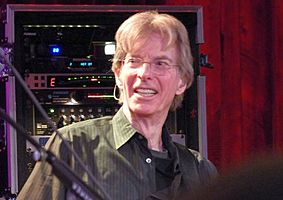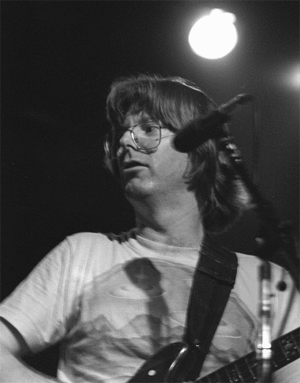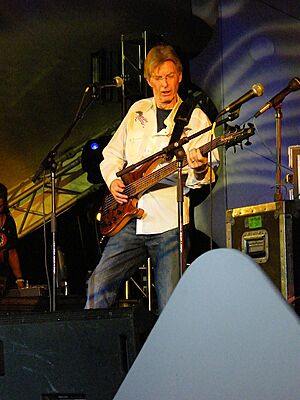Phil Lesh facts for kids
Quick facts for kids
Phil Lesh
|
|
|---|---|

Lesh performing in 2013
|
|
| Background information | |
| Birth name | Philip Chapman Lesh |
| Born | March 15, 1940 Berkeley, California, U.S. |
| Died | October 25, 2024 (aged 84) |
| Genres |
|
| Occupation(s) | Musician, songwriter |
| Instruments |
|
| Years active | 1960–2024 |
| Labels |
|
Philip Chapman Lesh (born March 15, 1940 – died October 25, 2024) was an American musician. He was a founding member of the famous band Grateful Dead. Phil Lesh played the bass guitar for the band during their entire 30-year career.
After the Grateful Dead stopped performing in 1995, Lesh continued to make music. He started a project called Phil Lesh and Friends. This group honored the Grateful Dead's music by playing their songs. They also played new songs written by members of his own group. Lesh also ran a music place called Terrapin Crossroads. From 2009 to 2014, he played in a band called Furthur. He played alongside Bob Weir, another former Grateful Dead bandmate. After 2014, he toured less but still performed concerts.
Contents
Early Life and Music
Phil Lesh was born in Berkeley, California, on March 15, 1940. He first started playing the violin. When he was in Berkeley High School, he switched to playing the trumpet. He joined many music groups at school. He studied the trumpet with Bob Hansen, who led the Golden Gate Park Band. This made him interested in modern classical music and a type of jazz called free jazz.
Later, he went to the College of San Mateo. There, he wrote music for the college's big band and played trumpet. In 1961, he moved to the University of California, Berkeley. He became friends with Tom Constanten, who would later be a keyboard player for the Grateful Dead. Constanten encouraged him to study music with a famous Italian composer named Luciano Berio.
While working as a recording engineer for a radio station, he met Jerry Garcia. Garcia played the banjo in a style called bluegrass. Even though they liked different kinds of music, they became good friends. In 1965, Lesh saw Garcia's new band, the Warlocks, play. He was very impressed. A few weeks later, Garcia asked him to join the band as their bass player. This was surprising because Lesh had never played the bass before! He learned to play "on the job" and stayed with the band until the very end.
Because Phil Lesh learned bass without any old rules, he played it in a new way. He said his style was more like Bach's classical music than other rock bass players. He also looked up to Jack Bruce from the band Cream.
His Unique Music Style
Phil Lesh was a pioneer in how the electric bass was played in the 1960s. Before him, bass players mostly kept the beat of a song. But Lesh, along with others like Jack Casady and Paul McCartney, started playing more melodic lines. This means his bass parts were like mini-melodies within the song.
Lesh would often play his own improvised parts during songs. This was a key part of the "San Francisco Sound" in rock music. In live shows, Lesh's bass playing would often weave around Jerry Garcia's guitar solos.
Phil Lesh was also very creative in the recording studio. He loved exploring new sounds. Sometimes, his ideas led to extra costs for the band's record label. He was seen as someone who pushed the band to try new things. Lesh did not write or sing many songs for the Grateful Dead. But he did write "Box of Rain," which is the first song on their album American Beauty. In the early days, his high voice helped with the band's harmonies. Later, he stopped singing high parts due to vocal cord issues. But in the 1980s, he started singing lead vocals again on songs that fit his natural voice.
Lesh introduced his bandmates to the music of jazz saxophonist John Coltrane. This jazz influence helped the Grateful Dead create their unique sound. He also showed them the music of composer Charles Ives. This helped the band move smoothly from wild, unplanned jams to blues or country songs.
In 1994, Phil Lesh was honored. He was inducted into The Rock and Roll Hall of Fame as a member of the Grateful Dead.
After the Grateful Dead
After the Grateful Dead broke up, Phil Lesh kept playing music. He performed with bands like The Other Ones and The Dead. He also played with his own band, Phil Lesh and Friends. In 1999 and 2000, he toured with the famous singer Bob Dylan.
In 2005, Lesh wrote a book about his life called Searching for the Sound: My Life with the Grateful Dead.
In 2009, Lesh toured again with the other members of the Grateful Dead. After that tour, he started a new band called Furthur with Bob Weir. They began performing in September 2009.
In 2012, Lesh opened a music place called Terrapin Crossroads in San Rafael, California. It opened on March 8, 2012, with many concerts by Phil Lesh and Friends. When Lesh was not touring, his sons, Grahame and Brian, often played there. They played Grateful Dead songs and music by newer bands. Terrapin Crossroads closed in November 2021.
Phil Lesh continued to perform with Phil Lesh and Friends from 2012 onwards. Furthur stopped playing in early 2014. At 74 years old, Lesh stopped touring full-time. But he still played regularly at Terrapin Crossroads with different groups. He also played special shows at other places and music festivals.
In 2015, he took part in the Fare Thee Well concerts. These shows celebrated 50 years of the Grateful Dead. In 2018, he did a short tour with Bob Weir.
In 2020, Rolling Stone magazine named him the 11th greatest bass player of all time. In March 2023, he celebrated his 83rd birthday and his 100th show at the Capitol Theatre.
Personal Life
Phil Lesh and his wife, Jill, ran a charity called the Unbroken Chain Foundation. They had two sons, Grahame and Brian. Both of their sons also became musicians. The three of them often played music together.
In 1998, Lesh had a liver transplant because of a serious liver condition. After that, he became a strong supporter of organ donor programs. He often encouraged people at his concerts to become organ donors.
In 2006, Phil Lesh shared that he had been diagnosed with prostate cancer. In December 2006, he announced that he had surgery and the cancer was removed.
In October 2015, Lesh had surgery for bladder cancer. He said he was doing well and expected to fully recover.
In August 2019, Lesh announced he would have back surgery. Because of this, he had to cancel some upcoming shows. He was expected to make a full recovery.
Death
Phil Lesh passed away on October 25, 2024. He was 84 years old.
Discography
The Other Ones:
- The Strange Remain (1999)
Phil Lesh and Friends:
- Love Will See You Through (1999)
- There and Back Again (2002)
- Live at the Warfield (2006)
See also
 In Spanish: Phil Lesh para niños
In Spanish: Phil Lesh para niños
 | James Van Der Zee |
 | Alma Thomas |
 | Ellis Wilson |
 | Margaret Taylor-Burroughs |



